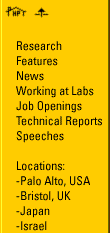| |
HP Labs Technical Reports
Click here for full text:

How to share a Quantum Secret
Cleve, Richard; Gottesman, Daniel; Lo, Hoi-Kwong
HPL-98-205
Keyword(s): quantum information; secret sharing; quantum cryptography; quantum computation
Abstract: Please Note. This abstract contains mathematical formulae which cannot be represented here. We investigate the concept of quantum secret sharing, where a secret quantum state is distributed between n parties in such a way that certain subsets of the parties can jointly recover the secret, while other subsets of the parties can acquire absolutely no information about it. In a ((k,n)) threshold scheme, any subset of k or more parties can reconstruct the secret, while any subset of k-1 or fewer parties can obtain no information. We show that the only constraint on the existence of threshold schemes comes from the quantum "no-cloning theorem," which requires that n <2k, and, in all such cases, we give an efficient construction of a ((k, n )) threshold scheme. We also explore similarities and differences between quantum secret sharing schemes and quantum error-correcting codes. One remarkable difference is that, while most existing quantum codes encode pure states as pure states, quantum secret sharing schemes must use mixed states in some cases. For example, if k < n < 2k -1 then any ((k,n)) threshold scheme must distribute information that is globally in a mixed state. Notes: Richard Cleve, Department of Computer Science, University of Calgary, Calgary, Alberta, Canada T2N 1N4 & Daniel Gottesman, T-6 group, Los Alamos National lab., Los Alamos, NM 87545, USA
11 Pages
Back to Index
|




